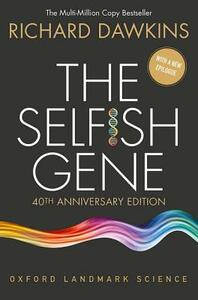You need to sign in or sign up before continuing.
Take a photo of a barcode or cover
I've been meaning to read this book for about ten years now, and it doesn't disappoint. There wasn't much in this book I wasn't already familiar with, but this is probably a testament to how well thought out and logical Dawkins' assessments were at the time; the book has aged remarkably well, and the final two "bonus" chapters from the 2nd edition draw some interesting conclusions.
Though I'd previously internalized much of [book:The Selfish Gene]'s ideas, Dawkins' prose elucidates the genetic basis for selection in an extremely powerful way. Overall an engaging, informative, and entertaining book.
Though I'd previously internalized much of [book:The Selfish Gene]'s ideas, Dawkins' prose elucidates the genetic basis for selection in an extremely powerful way. Overall an engaging, informative, and entertaining book.
challenging
informative
slow-paced
Great overview of gene centered evolution. Though this book suffers from misunderstood title syndrome (many read the title and assume its about promoting selfish because of evolution, which is incredibly WRONG) it is an excellent book. He applies game theory to evolution which is a big one. Good read.
hopeful
informative
inspiring
mysterious
slow-paced
informative
reflective
medium-paced
Well written book. You don't need to be an evolutionary biologist to understand the concepts he's putting forward, because he uses language that pretty much anyone can understand (while meticulously making sure that these comparisons can be translated back if necessary).
The audio book was a little confusing because of all the end notes and updates. He'd explain something, then the next sentence would be: "End Note: That's actually totally wrong, jk. Here's the correct result". Not that an intelligent human being can't hear both and recognize that one is right and the other is wrong, of course.
Overall, I enjoyed this book and I'll certainly be picking up his other books in the near future.
The audio book was a little confusing because of all the end notes and updates. He'd explain something, then the next sentence would be: "End Note: That's actually totally wrong, jk. Here's the correct result". Not that an intelligent human being can't hear both and recognize that one is right and the other is wrong, of course.
Overall, I enjoyed this book and I'll certainly be picking up his other books in the near future.
challenging
informative
reflective
medium-paced
After years of reading references to this book, I finally got around to reading the book itself. It's now clear to me just why there are so many references out there to it. There are some very interesting ideas, presented in a very coherent fashion.
The thesis is that evolution happens on the scale of "replicators" (genes, usually), not on the scale of individuals or groups. This explains the evolution of altruistic behaviors: a gene can sacrifice the good of the individual carrying it if there's enough benefit to others who are likely to be carrying it as well.
There's a chapter at the end about how genes may no longer be the state of the art in replicators, and that ideas (Dawkins coined the word "meme") may be the next big thing.
The thesis is that evolution happens on the scale of "replicators" (genes, usually), not on the scale of individuals or groups. This explains the evolution of altruistic behaviors: a gene can sacrifice the good of the individual carrying it if there's enough benefit to others who are likely to be carrying it as well.
There's a chapter at the end about how genes may no longer be the state of the art in replicators, and that ideas (Dawkins coined the word "meme") may be the next big thing.





